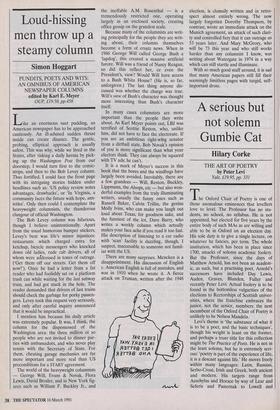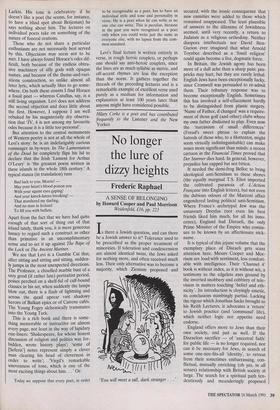A serious but not solemn Gumbie Cat
Hilary Corke
THE ART OF POETRY by Peter Levi Yale, £19.95, pp. 331 The Oxford Chair of Poetry is one of those anomalous eminences that levellers love to level. The Professor has no stu- dents, no school, no syllabus. He is not appointed, but elected for five years by the entire body of such MAs as are willing and able to be in Oxford on an election day. His sole duty is to give a single lecture, on whatever he fancies, per term. The whole institution, which has been in place since 1700, smacks of solemn academic foolery. But the Professor, since the days of Matthew Arnold, has not been an academ- ic, as such, but a practising poet. Arnold's successors have included Day Lewis, Auden, Graves, Blunden, Fuller and recently Peter Levi. Actual foolery is to be found in the bottomless vulgarities of the elections to Rectorships of Scottish univer- sities,. where the franchise embraces the junior, not the senior, members: the next incumbent of the Oxford Chair of Poetry is unlikely to be Nelson Mandela.
Levi's theme is 'the substance of what it is to be a poet, and the basic techniques', though his weight is leant on the former, and perhaps a truer title for this collection might be The Practice of Poets. He is not in the least solemn, but he is extremely seri- ous: 'poetry is part of the experience of life, it is a descant against life.' He moves freely within many languages: Latin, Russian, Serbo-Croat, Irish and Greek, both ancient and modern. His targets range from Aeschylus and Horace by way of Lear and Seferis and Pasternak to Lowell and
Larkin. His tone is celebratory: if he doesn't like a poet (he seems, for instance, to have a blind spot about Betjeman) he says nothing about him. The lectures on individual poets take on something of the nature of funeral orations.
Those who do not share a particular enthusiasm are not necessarily best served by this. Objections may seem not to be met. I have always found Horace's odes dif- ficult, both because of the endless obtru- sive machinery of silly gods with opaque names, and because of the theme-and-vari- ations construction, so unlike almost all later lyric, which actually likes to go some- where. On both these counts I find Horace a fossil poet — whereas Catullus, say, is a still living organism. Levi does not address the second objection and does little about the first. However, I suppose I am well rebuked by his magisterially dry observa- tion that 'IV, 4 is not among my favourite odes because it is a little too personal'.
But attention to the central monuments of Western poetry is not at all the whole of Levi's story: he is an indefatigably curious rummager in by-ways. In The Lamentation of the Dead he completely flips his lid to declare that the Irish 'Lament for Arthur O'Leary' is 'the greatest poem written in these islands in the whole 18th century.' A typical stanza (in translation) runs
Bad luck to you, Morris! — May your heart's blood poison you With your squint eyes gaping! And your knock-knees breaking! — That murdered my darling, And no man in Ireland To fill you with bullets.
Apart from the fact that we have had quite enough of that sort of thing out of that island lately, thank you, it is mere generous lunacy to regard such a construct as other than primitive in an uncomplimentary sense and to set it up against The Rape of the Lock or The Ancient Mariner.
We see that Levi is a Gumbie Cat that, after sitting and sitting and sitting, sudden- ly jumps in the most unexpected directions. The Professor, a chiselled marble bust of a very good (if rather late) portraitist period, Poises perched on a shelf-ful of calf-bound classics in his set, when suddenly the lamps blow out, there is a flash of lightning and across the quad uprear vast shadowy heroes of Balkan epics or of Cairene cafés. The Young Fogey alchemically transmutes into the Young Turk.
This is a rich book and there is some- thing memorable or instructive on almost every page, not least in the way of lapidary one-liners: 'Shakespeare, for whom honest discussion of religion and politics was for- bidden, wrote history plays'; 'some of [Seferis'l notes represent simply a clever man clearing his head of cleverness in order to write; `Virgil's remarkable unevenness of tone, which is one of the most exciting things about him. . . 'Or:
Today we suppose that every poet, in order to be recognisable as a poet, has to have an individual style and tone and personality in verse. He is a poet when he can write as no one else can write. This is peculiar, because in the past you were recognised as a poet only when you could write just the same as everyone else, with no lapses from the com- mon standard.
Levi's final lecture is written entirely in verse, in rough heroic couplets, or perhaps one should say anti-heroic couplets, since the lines are as much syllabic as metric, and off-accent rhymes are less the exception than the norm. It gathers together the threads of the preceding lectures and is a remarkable example of excellent verse used purely as a medium for information and explanation at least 100 years later than anyone might have considered possible.
Hilary Corke is a poet and has contributed frequently to the Listener and the New Yorker.



























































 Previous page
Previous page